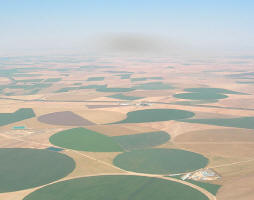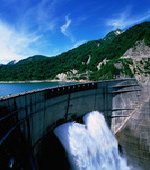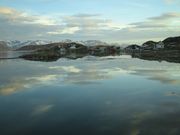 The storied Mediterranean faces climate change
The storied Mediterranean faces climate change
In the first of a four-part series, the Monitor examines the impact of
man-made pressures on the region.
From ancient Egypt to Rome, the fertile Mediterranean has sustained great
empires for millenniums. But modern development is rapidly turning the
cradle of Western civilization into a dry and inhospitable place, its coasts
covered in hotels and many of its unique species driven to extinction.
In the past 30 years, coastal populations have grown some 50 percent.
Coastal cities have doubled. Tourism has exploded: By 2025, 312 million
tourists will visit each year. Water usage is twice that of 1950. More than
100 species are endangered.
Now, climate change is exacerbating the situation.
The region's climate may already be changing faster than projected. In
June, a recording station in Athens measured the highest temperature ever
recorded there, nearly 113 degrees Fahrenheit.
Overall, temperatures for the summer months were about 5 degrees warmer
than average. Months passed without rain. Then deadly fires swept across the
country, killing at least 67 people and scorching some 650,000 acres of
land.
The abnormal weather in 2007 is not proof that climate change is here,
scientists say, but it is a strong indicator. And it's a taste of what's
likely to come if the world continues to spew greenhouse gases into the
atmosphere.
In Turkey, heat and drought caused major crop failures and forced Ankara to
ration city water. By autumn, the water supplies in Cyprus's reservoirs had
dwindled to 9 percent of capacity. Fires raged across Spain, Italy, Croatia,
and Algeria in one of the worst seasons since the European Union began
tracking in the 1980s.
This week, the 22 signatories of the 1976 Barcelona Convention, an
agreement to protect the Mediterranean, are meeting in Almeria, Spain.
Despite international efforts, however, the pace of environmental
destruction in the Mediterranean has quickened.
Climate change adds a new threat to the list. The Nobel-prizewinning IPCC
identified the Mediterranean – already hot and short of water – as one of
the world's regions most vulnerable to global warming.
A new report by the UN Environment Program (UNEP) highlights the sea's
eastern and southern shores as potential hot spots where climate change
could turn the scramble for scarce resources nto sources of conflict, as
well as increase the pace of illegal migration.
On a political level, the urgency of the Mediterranean's environmental
situation has been understood for at least three decades. In 1975, just
three years after the creation of the UNEP, the countries bordering the sea
created the Mediterranean Action Plan and a year later signed the Barcelona
Convention, committing themselves to regional environmental cooperation. It
was the first such agreement of its kind in the world.
Over the years, the convention – expanded in 1995 to coastal areas – has
served as the framework for a number of environmental initiatives – to
reduce land-based pollution, for example – as well as an important
foundation for regional cooperation. This week, ministers from the 22
Barcelona Convention countries and territories will hold their biannual
meeting where they are expected to discuss climate change and agree to new
regulations on coastal development.
The convention has often broken new ground on environmental cooperation,
creating a model that has been used in other parts of the world. But it also
illustrates how difficult transforming concern into effective action can
be.
"Barcelona is one of the oldest conventions in the world and it helped
create an awareness that there was a common good to protect," says François
Simard, a Mediterranean researcher with the World Conservation Union (IUCN).
"It's true that one can say it's a huge amount of energy that is going into
that convention and the results are not enough. But without the Barcelona
Convention, I'm sure things would be much worse."
| Contact information | n/a |
|---|---|
| News type | Inbrief |
| File link |
http://www.csmonitor.com/2008/0114/p01s03-woeu.html |
| Source of information | By Nicole Itano | Correspondent of The Christian Science Monitor |
| Keyword(s) | UNEP-MAP, climate change |
| Subject(s) | POLICY-WATER POLICY AND WATER MANAGEMENT , RISKS AND CLIMATOLOGY |
| Relation | http://www.semide.org/initiatives/map |
| Geographical coverage | Greece, Turkey, Mediterranean |
| News date | 14/01/2008 |
| Working language(s) | ENGLISH |
 you are not logged in
you are not logged in





